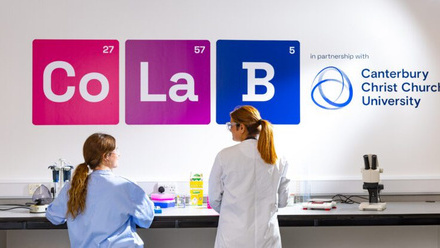
Introduction

This quarter has seen a cascade of government policy announcements, including the Spending Review and Industrial Strategy. Our team have been rigorously scrutinising and gearing up for the launch of the Life Sciences Sector Plan and the NHS 10-Year Health Plan, two transformative frameworks that could redefine the future of our sector.
We’ve also supported our members through a period of international turbulence and shifting policy landscapes. From evolving geopolitical dynamics and uncertainty in US trade policy to the renewed global focus on defence and national security, these developments highlight the critical need for agility, strategic collaboration, and resilience to protect and propel the UK’s biotech sector on the world stage.
Against this complex backdrop, we delivered BIA’s 25th annual Parliament Day and amplified the UK biotech’s voice across parliamentary committees, policy consultations, and international conventions - demonstrating the sector’s unique strengths, cutting-edge innovation, and global leadership.

Read on for a comprehensive update on these developments and more.
Government and Parliament
BIA calls for bold action for life sciences at 25th annual Parliament Day

The week before the Chancellor’s Spending Review, the 25th anniversary of BIA’s Parliament Day brought together 49 BIA members to meet with policymakers in Westminster. This concentrated day of engagement enabled sector leaders to speak with a unified voice, secure visibility with key stakeholders, and reinforce why life sciences deserves its billing as one of the UK’s eight “growth-driving” industries.
Over 30 targeted meetings, including a roundtable with Treasury officials and intimate discussions with both government and shadow minsters, members ensured the commercial realities of biotech were well understood by decision-makers at a time when major fiscal, regulatory and industrial decisions were in play. Members set out three clear priorities for government action: unlocking scale-up capital (outlining the case for pension reform), making the NHS a true engine of innovation, and doubling down on the UK’s R&D and manufacturing strengths.
This high-level engagement underlined the sector’s role in driving economic growth and positioned BIA members at the heart of conversations shaping the UK’s future innovation economy.
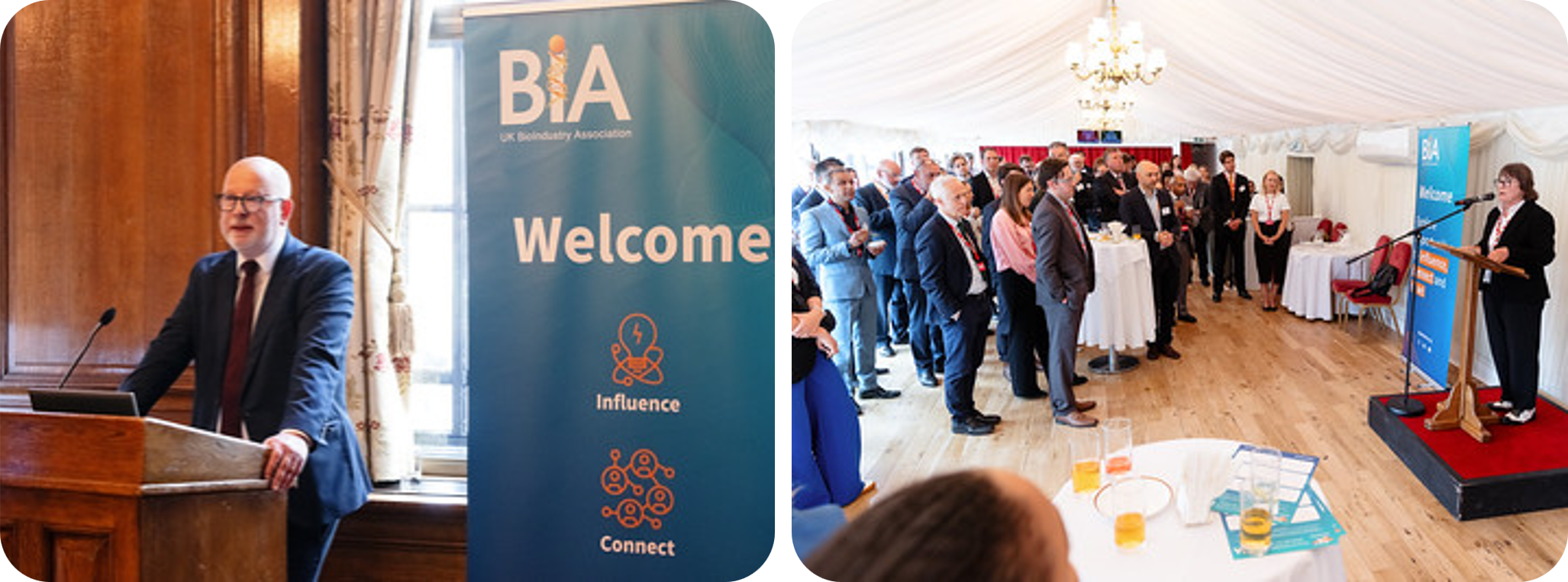
Steve Yemm MP, Labour Biotechnology champion, sharing insights at a breakfast briefing, and the Baroness Morgan of Drefelin, Officer of the APPG for Life Sciences, hosting our lunch reception in the House of Lords.
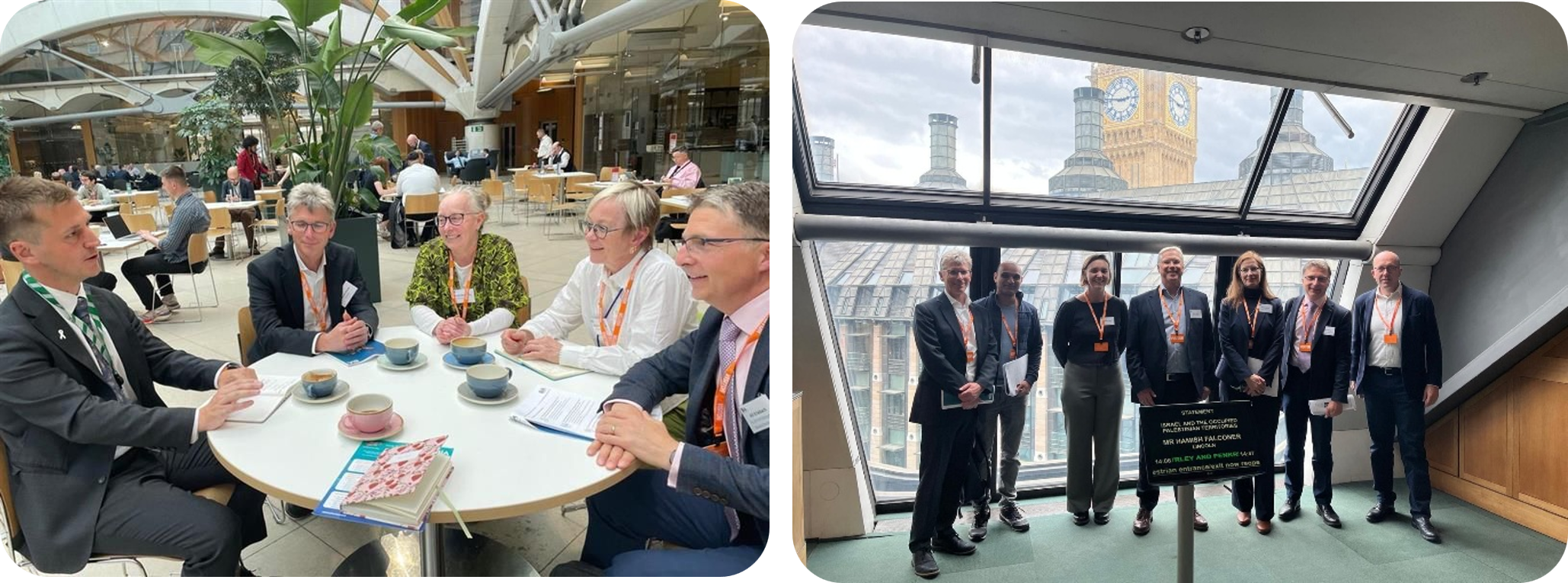
Meetings with MPs and senior officials in government offices
Spending Review and Industrial Strategy deliver investment for BIA priorities

The Industrial Strategy published on 23 June, which identifies life sciences as one of eight priority growth sectors, added further detail to the Spending Review allocations and government priorities.
The BBB’s budget was increased by two-thirds, with an additional £4 billion for a new Industrial Strategy Growth Capital fund to support the priority growth sectors. BIA is co-hosting a roundtable with the BBB on 9 July to inform the fund’s strategy.
The Department for Science, Innovation and Technology (DSIT) settlement provides a real terms budget growth rate of 2.8% over the spending review period, with increased R&D funding reaching £15.2 billion per year by 2029-2030. Life sciences and engineering biology were noted as areas for extra investment, alongside the full £520 million for the Life Sciences Innovative Manufacturing Programme.
Read BIA’s full Spending Review analysis, webinar and press release on the Industrial Strategy for more details and all announcements relevant to our members.

Pharma tariffs avoided following BIA awareness raising
Following weeks of speculation, pharmaceuticals were spared from the US’ initial set of tariffs announced on 2 April, pending a supply chain and national security review being undertaken by the US Department of Commerce.
In the run-up to the announcement, BIA spoke extensively in the media- including BBC Radio 4, Channel 4 and GB News - about the threat to the UK life sciences sector, should tariffs be imposed. We also engaged the UK Government privately to inform its representations to the US Administration.
BIA also submitted input to the UK Government’s consideration of retaliatory tariffs, raising concerns about impacts on R&D equipment and consumables, and some ingredients used in medicines manufacturing. We urged the Government to seek a no-tariffs deal for the sector.
An agreement between the US and UK, reached on 8 May by President Donald Trump and Prime Minister Sir Keir Starmer, brought further relief with promised special treatment for UK pharmaceuticals exports to the US, should any tariffs be imposed following the national security review.
In parallel to working with Government, BIA has been engaging Parliamentarians to ensure a broad understanding of the potential impact of tariffs on the sector. CEO Steve Bates gave evidence to the House of Commons Business and Trade Select Committee, and met with Liberal Democrat trade spokesperson Clive Jones MP.
Minister Vallance launches London Life Sciences Week at BIO
Minister Vallance launches London Life Sciences Week at BIO
The Minster for Science, Lord Patrick Vallance, launched London Life Sciences Week on the UK stand at the BIO International Convention on 17 June, alongside BIA’s CEO, Steve Bates OBE, and London & Partners’ CEO, Laura Citron OBE.
London Life Sciences Week (16-21 November 2025) is organised by BIA and London & Partners, and comprises a range of conferences, networking events, and public engagements focused on innovation, investment, and the growth of life sciences companies across the length and breadth of the UK, anchored by the Jefferies Banking Healthcare Conference.
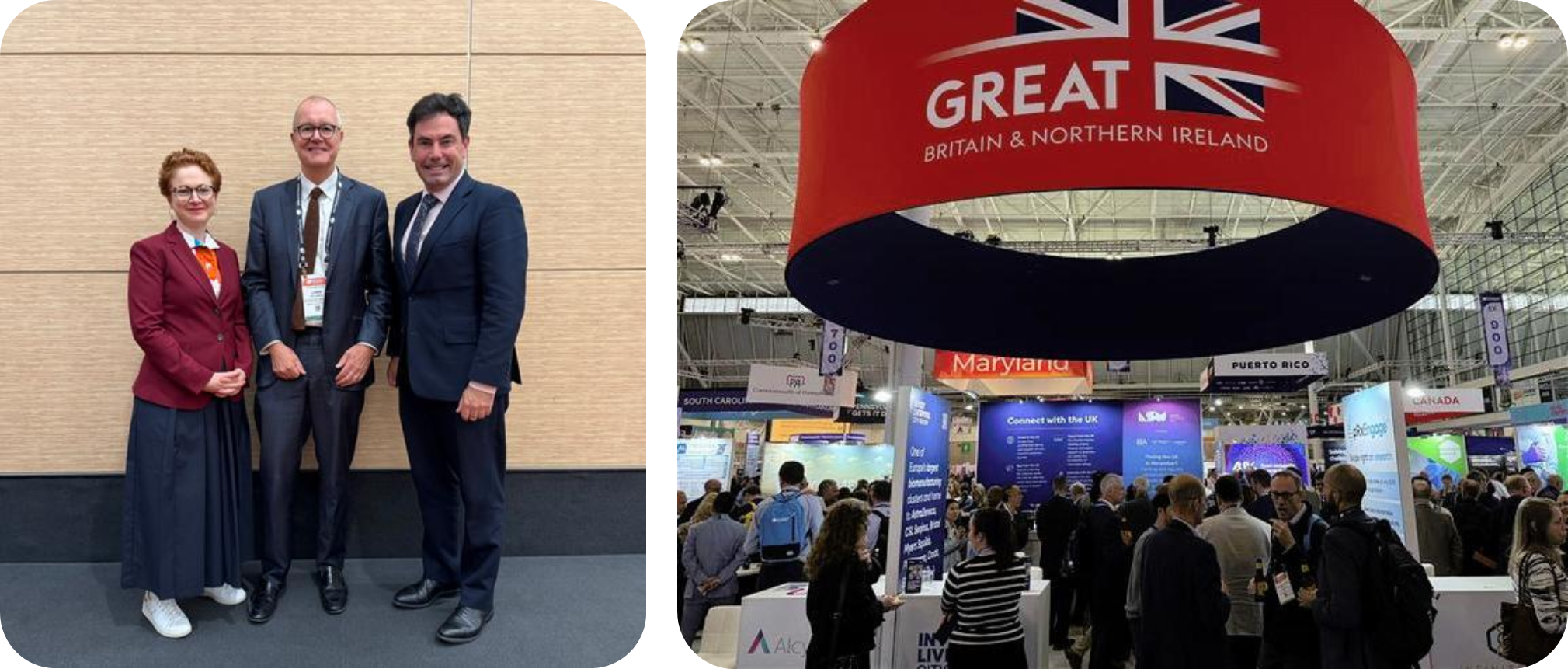
Steve Bates OBE, Lord Vallance and Laura Citron OBE at BIO
Life sciences in the North East showcased to Chi Onwurah MP
Life sciences in the North East showcased to Chi Onwurah MP
BIA hosted a roundtable with Chi Onwurah, MP and chair of the commons Science Innovation and Technology select committee (SITC) to explore how the North East can build on its scientific and industrial legacy to become a hub for life sciences innovation. Attendees included regional biotech leaders, academics, and policymakers, who discussed strengths, barriers, and opportunities across the sector. The discussion highlighted the region’s capabilities (five world-class universities, 13.8% of the UK’s pharmaceutical GVA, and advanced clinical trial infrastructure) while raising investment disparities and talent gaps. A summary of the discussion has been submitted to SITC’s inquiry on innovation, growth and regions.
The BIA is committed to supporting the North East and collaborating with government to harness the region’s skills, talent, and infrastructure in building a world-class life sciences cluster. The strength of the region’s innovation is evident in its dynamic start-up and scale-up communities. Creating the right conditions to support their journey from idea to impact remains a key priority.
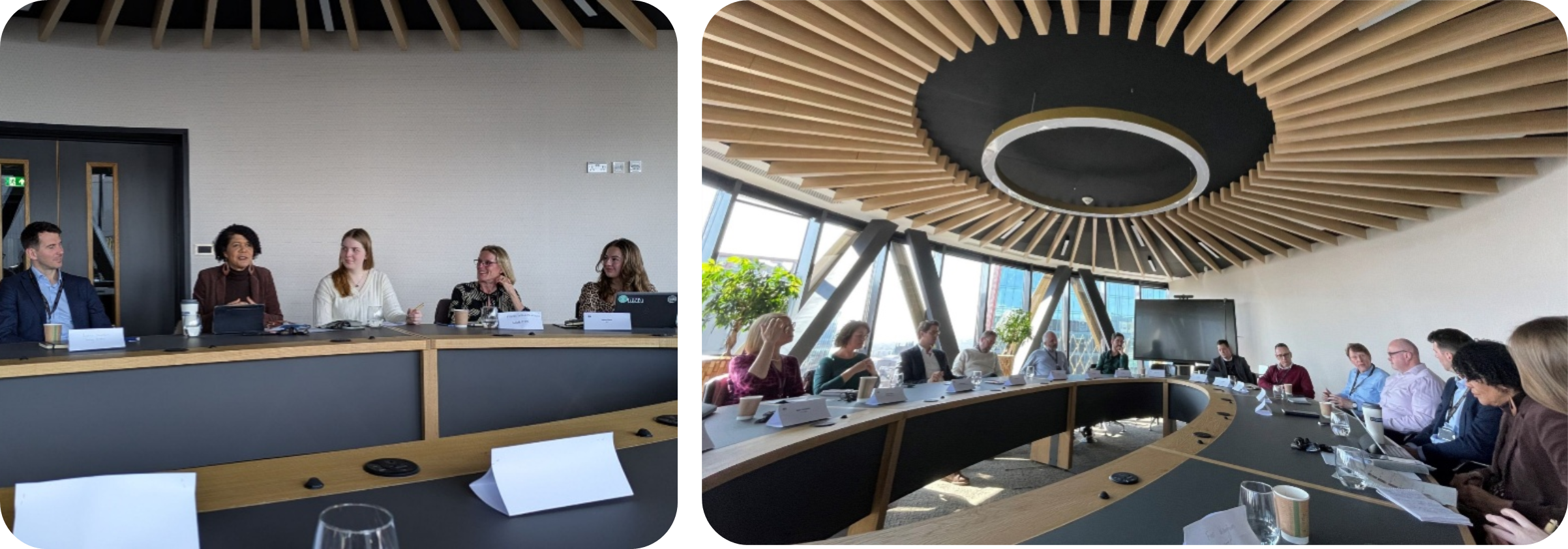
Local industry representatives meet with Chi Onwurah MP at the Newcastle Helix Centre
APPG roundtable assembles key voices to discuss Life Sciences Sector Plan
APPG roundtable assembles key voices to discuss Life Sciences Sector Plan
Under the banner of the All-Party Parliamentary Group (APPG) for Life Sciences, BIA organised the first in a new series of parliamentary roundtables, which explored priorities for the Life Sciences Sector Plan and the important symbiosis between the UK’s R&D ecosystem and business environment.
Chaired by Rt Hon Kit Malthouse MP, the meeting convened representatives from industry, academia and the charitable sector with Roz Campion, Director at the Office for Life Sciences, and APPG Officers the Baroness Morgan of Drefelin and Sadik al Hassan MP. Speaking on behalf of SMEs, BIA’s Melissa Strange (EnteroBiotix CFO and FTAC Chair) highlighted their collective importance as the feeding engine for medical innovation and ongoing challenges accessing finance.
The APPG for Life Sciences exists to raise awareness and understanding of the sector’s contribution to the nation’s health and economy, as well as the role of charities, industry, and academia in funding and driving medical research and commercialisation. BIA provides the secretariat to the APPG in collaboration with the Association of Medical Research Charities, with support from other industry, charity and academic partners, holding four annual events and keeping parliamentarians informed of key developments in life sciences by a weekly newsletter.

APPG Roundtable in Portcullis House
Business environment
Finance and Tax
Government legislates to mandate pension fund investment as BIA calls for bold action
The BIA has dialled-up its campaign on pension fund reform, calling for bolder action from government and the mandation of pension funds to invest in UK venture capital and life sciences. This quarter alone has seen the BIA publish multiple press releases, calling for bold action from government, and outlining our case for mandating pension fund investment, as well as the publication of a two letters in The Times championing the government’s legislation for reserve powers to mandate pension funds in the Pension Schemes Bill.
In May, a new Mansion House Accord was signed by Chancellor Rachel Reeves and 17 major pension providers committing to a minimum allocation into private markets of 10% by 2030, with a requirement for 5% to be invested into the UK.
These developments are yet another important step in BIA’s long campaign to increase pension fund investment into UK venture capital. Increasing venture capital is vital for scaling UK life science companies, who often struggle to find adequate UK investment.
The need for scale-up capital raised by BIA in Lords call for evidence
The BIA submitted a response to a House of Lords Science and Technology Committee call for evidence, looking at the financing and scaling of UK science and technology. The inquiry sought to understand why the UK can struggle to translate its R&D and innovation into economic growth, and companies that start, scale, and stay in the UK.
This struggle to scale has long been a priority issue for the BIA, and in our response, we highlighted the UK’s underinvestment in life science companies in spite of its world-leading strength – with the largest gap occurring at scale-up. We said government schemes such as venture capital incentives, and R&D tax reliefs, as well as actions and initiatives from the British Business Bank (BBB) were critical to scaling companies. We went on to explain that pension funds are well placed to increase their exposure to late-stage VC funds and growth-stage public market deals, and could make a fundamental difference to improving the UK environment for the translation of R&D and innovation into economic growth.
BIA advocates for life sciences and engineering biology in new National Wealth Fund
The BIA has pushed for life sciences and engineering biology to receive greater investment from the newly launched National Wealth Fund (NWF), a government-backed economic development bank that will focus on funding projects to help meet the government’s growth and clean energy missions.
Through our submission to a Treasury Select Committee call for evidence on the fund, and directly providing oral evidence to the Committee, we outlined how the sector could play a fundamental role in meeting the fund’s objectives, including generating returns for the taxpayer, and crowding in capital. Equally, the fund is well placed to address some of the sector-specific infrastructure gaps faced by the life sciences, and securing the fund’s commitment to the sector is an important step. Following this advocacy, BIA Chair Dan Mahony Chaired a life sciences roundtable with the NWF on 25 June to inform their strategic thinking for the sector.
The fund will sit on a continuum of other funding bodies, including Innovate UK, and the British Business Bank. BIA emphasised the importance of each of these bodies, and how working collaboratively and avoiding overlap will be key. We will continue to monitor how these bodies interact and advocate for clear, complementary roles where needed, and work further with the NWF on its strategy for the sector.
British Growth Partnership showcased at joint BBB and BIA roundtable
British Growth Partnership showcased at joint BBB and BIA roundtable
The BIA hosted a roundtable with the British Business Bank (BBB) that brought together investors from across the UK life sciences to increase their understanding of the newly launched British Growth Partnership (BGP).
The BGP is an investment vehicle run by British Business Bank to enable UK pension funds and other institutional investors to invest into the UK’s fastest-growing and most innovative companies. The partnership has initial expressions of intend from Natwest Cushon and Aegon, and more recently the London local government pension scheme. BGP got FCA approval to manage third-party money in May 2025, allowing it to become fully active.
The success of this scheme depends on the support and understanding of the VC community, so the roundtable was an important opportunity for investors to learn more about the scheme, develop a positive understanding and ensure the continued support of this essential stakeholder base.
BIA continues pushing for an effective and efficient R&D tax relief scheme
BIA continues pushing for an effective and efficient R&D tax relief scheme
BIA continues to advocate for an improved R&D tax relief scheme, submitting two consultation responses on tackling advance clearance, and increased powers for HMRC to tackle non-compliant tax advisors.
Error and fraud are some of the biggest barriers currently facing R&D tax reliefs. Advance clearance aims to reduce this and allow users to obtain clarity on whether a given claim will be successful before a formal submission. The BIA is very supportive of this in principle, but we advocated for allowing claimants to ask questions about specific aspects of a claim that may cause problems. This will be far more useful for life science companies that are fully aware that their work is legitimate R&D.
BIA welcomed measures that clamped down on non-compliant tax advisors, provided that legitimate claims and compliant sectors aren't negatively impacted.
If these measures prove successful in reducing the rates of error and fraud, and significant savings are achieved, BIA said government should increase the rate of R&D tax relief to ensure they remain internationally competitive.
IP and Tech Transfer
Innovators supported in WHO Pandemic Treaty shaped by BIA
On 20 May, the World Health Assembly (WHA), the decision-making body of the World Health Organisation (WHO), adopted a historic Pandemic Agreement that aims to improve future global preparedness and responses to pandemics. While the agreement deals with many aspects of pandemic preparedness and response, some aspects of the agreement are of direct significance to life sciences companies in the UK, particularly those involved in developing and manufacturing ‘pandemic-related health products’.
The BIA has engaged closely with the UK government throughout the negotiations of the agreement, providing in-depth industry insights and guidance to ensure any provision on tech transfer and the sharing of know-how and IP would be based on voluntary measures. We also leaned on our manufacturing expertise and longstanding experience in dealing with international agreements affecting genetic resources to shape the outcome of the new Pathogen Access and Benefit Sharing (PABS) System under the new treaty. We successfully leveraged these to prevent life sciences companies who develop pandemic treatments from facing inhibitive conditions, including a stringent requirement in an earlier draft of the agreement to make 20% of developer’s production of pandemic products available to the WHO. In a win to the sector, the final agreement allows but does not mandate manufacturers to participate in this, with greater flexibility given to the amount to be donated to the WHO.
The treaty will come into effect in the coming years. BIA will continue to advocate for UK life sciences innovators and manufacturers, particularly on the further development of the PABS System, as well as the treaty’s implementation in the UK.
BIA meets with CBD Secretary and weighs in on new Cali Fund
BIA submitted to a second Convention on Biological Diversity (CBD) consultation in April. This follows on from BIA’s response to the CBD’s March consultation on the new benefit sharing mechanism for Digital Sequence Information (DSI) and Cali Fund, which imposes financial expectations on companies using DSI.
The consultation sought views on definitions and thresholds for small, medium, and large size companies who are to contribute to the new Fund. In our response, we strongly supported the voluntary nature of the mechanism, highlighted the important contributions biotech companies already make towards the CBD’s aims, and reiterated the need for incentives if biotech companies are to contribute to the Fund.
In June, BIA met with CBD Secretary Astrid Schomaker and DEFRA officials in London to discuss the outstanding challenges inhibiting industry contributions, and increasing knowledge of the voluntary Fund among industries who want to contribute.
Find out more about the new voluntary Fund in this joint BIA-DEFRA webinar.
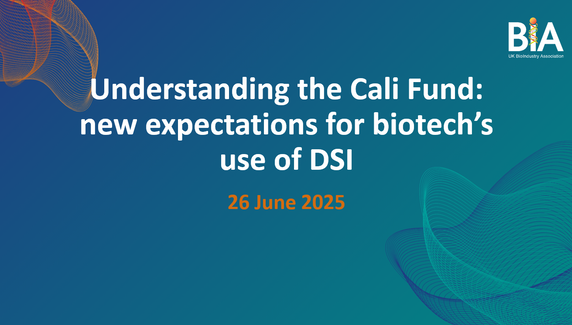
Bilateral with UK Government body covers breadth of BIA’s influence in life sciences IP
On 18 June, BIA held a bilateral meeting with the Intellectual Property Office (UKIPO). Attended by members of BIA’s Intellectual Property Advisory Committee (IPAC), the meeting covered a range of live topics impacting the life sciences sector, including the ongoing Copyright & AI debate, the Budapest Treaty, the IP chapter of the UK’s new India trade deal, and the exhaustion of IP regime.
Over the coming months, BIA will closely engage on the publication of the Government’s response to the Copyright & AI consultation, and the full India-UK FTA, ensuring the needs of the life sciences sector are represented.
BIA hosts life sciences roundtable as part of UKIPO’s IP attaché week
In April, BIA hosted a life sciences IP roundtable as part of the UKIPO’s IP attaché week, together with the ABPI. Members of BIA and ABPI’s IP advisory groups met with the UK’s IP attaches from across China, India, the US, EU, North Africa and the Middle East, and multilateral organisations in Geneva, to discuss trends in global IP narratives, and life sciences issues across geographies, such as regulatory data protection. Attendees also had the chance to assess the role of the UK in driving the pro-innovation and pro-IP agenda across multilateral fora.
The roundtable was the last in a series of roundtables that took place in Q1 and Q2 this year, placing the UK’s life sciences industry as a top-tier sector of UK interest abroad.

Roundtable with international IP attachés at BIA's offices
Regulation and Access
BIA engages with new MHRA CEO on future priorities for the agency
The BIA has welcomed the MHRA’s new CEO Lawrence Tallon, who started in the role in April. During a US trip to BIO and DIA Global, Lawrence set out his strategic direction and ambition for the MHRA to become “a global leader in risk-proportionate regulation”, by capitalising on its emerging strengths as a “fast, expert and open” regulator.
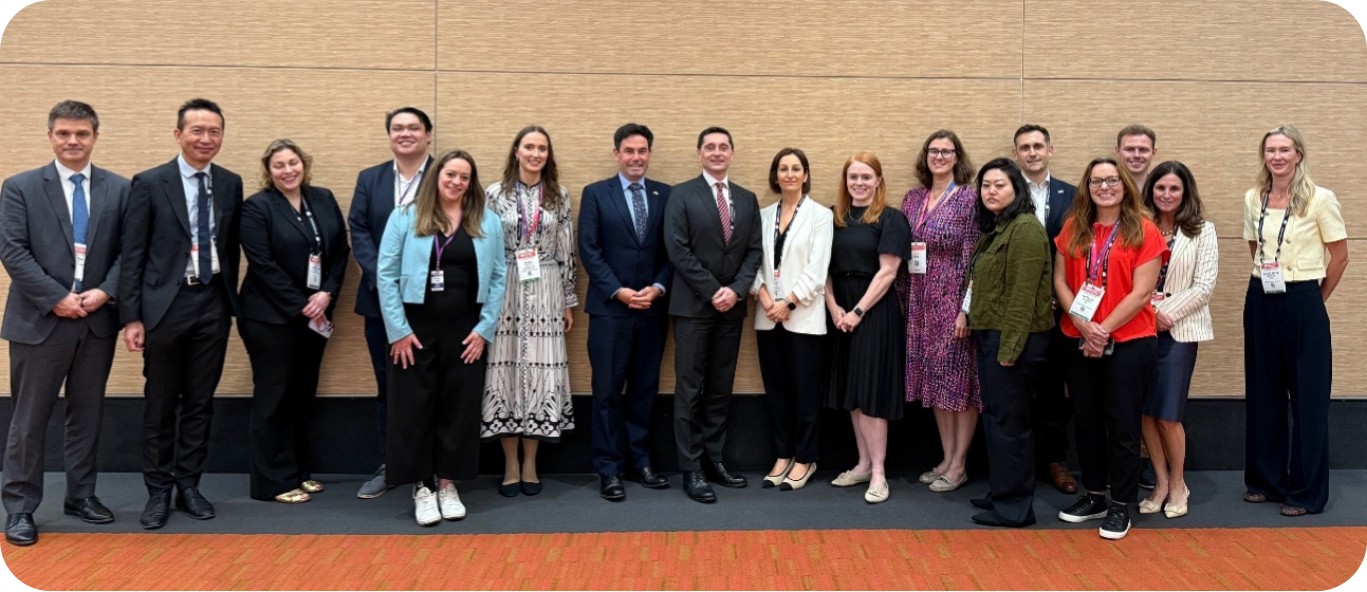
BIA and members of the UK delegation engaging with new MHRA CEO Laurence Tallon at BIO Boston
The MHRA has also published more detailed plans for the year ahead in its Business Plan for 2024/25, including modernising the UK’s regulatory framework for medicines and medical devices and closer collaboration with NICE to enable concurrent approvals. The BIA’s Regulatory Affairs Advisory Committee (RAAC) has been closely involved in the development of many of these priorities, including contributing to workshop in May to shape the MHRA’s plans for a new framework for the regulation therapies for rare diseases.
BIA drives UK clinical trial excellence as MHRA highlights new regulations and improved performance
BIA has been engaging with stakeholders, including MHRA CEO Lawrence Tallon, to highlight recent improvements to UK’s clinical trial environment and explore opportunities to attract companies to run trials in UK amid recent instability at the US FDA. We welcomed an MHRA press release to mark International Clinical Trials Day on 20 May, which highlighted the strengths of the UK’s clinical trial environment, with new regulations to support more streamlined approvals and sustained improved performance in the MHRA’s processing of applications. Our Q1 report detailed how the BIA’s close engagement with MHRA has helped to inform these changes, with BIA member feedback shaping MHRA guidance documents on the new regulations.
The MHRA also launched a consultation on the use of real-world data (RWD) for external control arms of clinical trials. This is an alternative study model to traditional randomised control trials (RCTs) for when enrolling patients into a placebo group may be impractical or unethical, instead supplementing control groups with data from sources such as electronic health records or disease registries. In our response to the consultation, BIA welcomed the MHRA’s pragmatic approach to this, and made a number of suggestions where the guidance could be improved to provide further clarity and enhance international alignment.
BIA calls for pro-innovation approach to NHS medicine spending as VPAG review continues
BIA has been calling for a pro-innovation approach to NHS medicines spending. This follows the announcement that the Voluntary Pricing, Access and Growth (VPAG) scheme payment rate for 2025 would be significantly higher than expected at 22.9%.
As set out in an article by BIA CEO Steve Bates, underinvestment in medicines has had significant consequences on UK competitiveness and patient outcomes, with the UK investing a smaller share (9%) of overall healthcare costs on medicines compared to other countries, including France (15%) and Germany (17%), and ranking 18th out of 19 comparable countries for treatable causes of mortality according to research from the King’s Fund.
We also responded the Department for Health and Social Care’s proposed review of the statutory scheme for branded medicine pricing. Developed with input from BIA membership, we voiced concerns with proposals to maintain the allowed growth rate for medicine spending and increase both schemes’ payment rates. We highlighted the implications on global investment in UK life sciences and patient access to new medicines, emphasised the sector’s unique position to deliver the Government’s health and growth missions, and called for a pro-innovation approach that encourages innovative companies to prioritise the UK market.
We strongly support the need for a shift in the Government’s approach towards medicine spending, recognising them as a key investment that drives the health and wealth of the nation. As the rapid review on VPAG continues, the BIA urges the Government to prioritise incentivising investment in medical innovation to foster the growth of the life science sector.
MHRA and BIA engagement continues at the first mRNA community connects event
BIA held the first mRNA Community Connects event at CPI in Darlington, bringing together experts and innovators in the field. Insightful presentations from the MHRA and Medicines Discovery Catapult (MDC) gave community members valuable updates on the draft guidance on individualised mRNA cancer immunotherapies, and on the Regulatory Requirements for Nanotechnology-Based RNA Vaccines Therapeutic. The open forum format provided members with the opportunity to engage directly with the regulator and ask questions about the first of its kind guidance. The presentations, discussions and round tables will be used to update our mRNA explainer with a critical regulatory section.
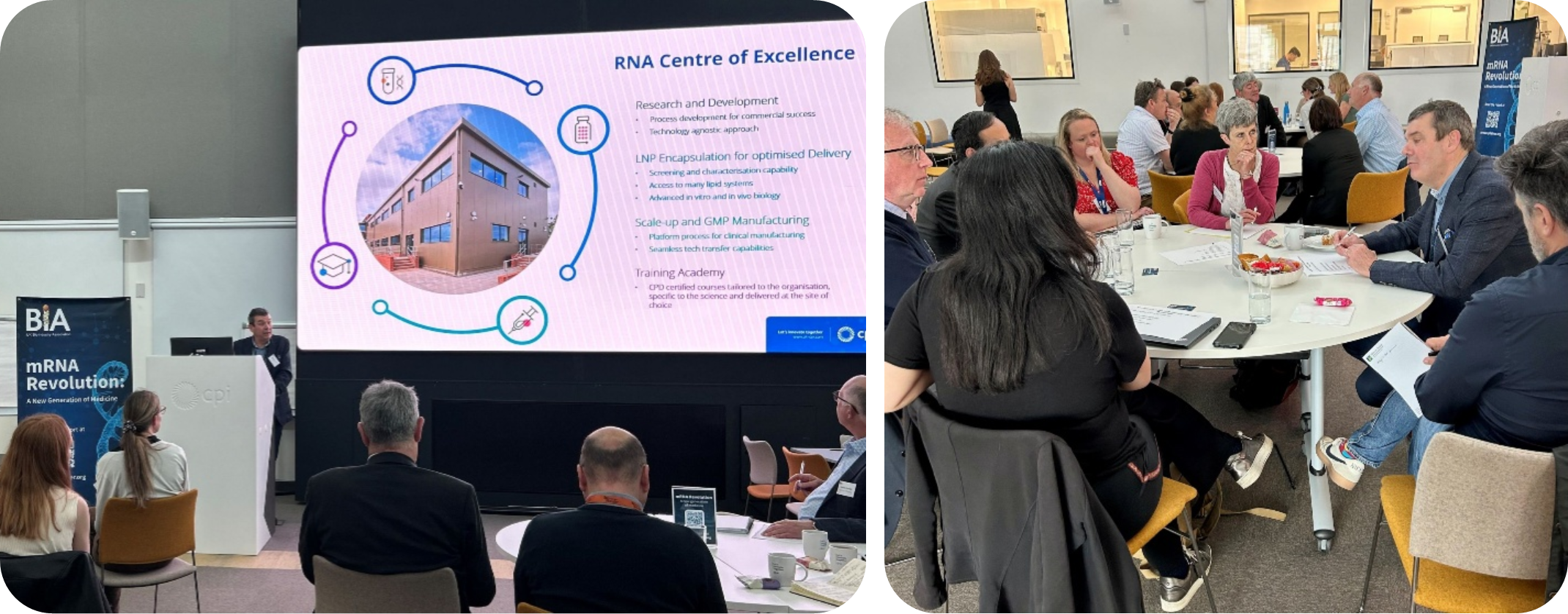
Brendan Fish, Director of Biologics and RNA CoE at CPI, presenting on their RNA capabilities (Left). Members participating in a round table discussion focusing on the challenges and oppourtunities in RNA for the treatment of infectious disease (Right).
Skills and Talent
In response to Government white paper, BIA engages with evolving immigration policy
BIA continues to actively engage with UK policymakers to ensure the needs of our sector are represented in the Government’s evolving immigration strategy. In response to the proposed changes outlined in the immigration white paper, Restoring Control Over the Immigration System, BIA has advocated for policies that support access to global talent while maintaining the sector's competitiveness.
We called for expansion of the Global Talent Visa, which will offer a streamlined, non-sponsored route for leading researchers and scientists within businesses, and proposed exemptions under the Temporary Shortage List to protect key technical roles. BIA has also raised concerns about the increased costs for employers, the higher salary and skills thresholds, complexities of the system as a whole and the reduction in Graduate Visa duration, highlighting the risk these changes pose to attracting early-career talent. BIA will continue to engage with Government to support a robust, skilled, and internationally connected innovative life sciences workforce.
BIA contributes to roundtable on reskilling our future engineering workforce
Alongside cross-industrial sector voices, BIA was pleased to support its members and contribute to shaping skills policy at an expert roundtable convened by the Institution of Chemical Engineers and the Institution of Mechanical Engineers. The workshop addressed the urgent need for reskilling in response to rapid technological change across AI, automation, and sustainable energy. By engaging in these discussions, the BIA helped ensure that the life sciences sector’s unique workforce needs are represented in broader engineering and policy conversations, advocating for a forward-looking skills agenda that supports both current employees and the future resilience of the UK economy. Further details can be found in IChemE's news release.
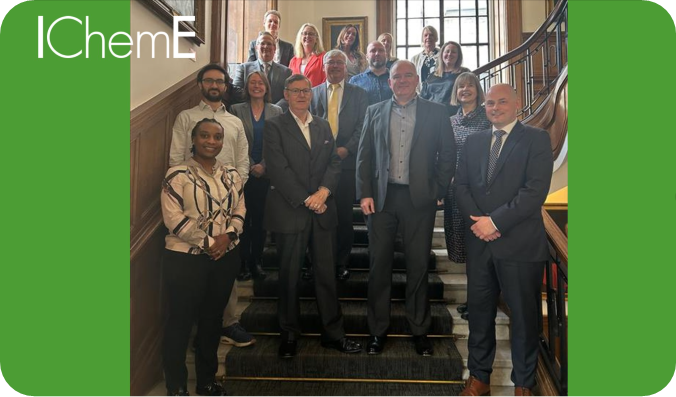
BIA skills Consultant Kate Barclay OBE at the IChemE roundtable
Best practice on promoting DEI shared by BIA at cross-Government workshop
In May the Women in Manufacturing UK initiative hosted a Diversity, Equity and Inclusion workshop in collaboration with the Department for Business and Trade and Cabinet Office. Alongside representatives from the eight growth sectors identified in the Industrial Strategy, BIA participated in discussions on critical skills gaps, the economic value of more inclusive industries and best practices for progress; sharing best practice evidence based sector reports including BIA’s Women in Biotech Leadership. The workshop also examined how the Industrial Strategy and Sector Plans can play a stronger role in coordinating and amplifying EDI across sectors while supporting inclusive growth.
Manufacturing
BIA welcomes confirmation of £520 million capital grants programme and continues to feedback on eligibility criteria
The 2025 Spending Review brought a welcome confirmation of funding for the Life Sciences Innovative Manufacturing Fund (LSIMF), a capital grants programme worth up to £520 million. The Spring Spending Review in 2024 had announced the initial £70 million tranche, and securing the continuation of the fund has remained a key priority for BIA members.
BIA has continued to advocate for the fund to be accessible to SMEs and for a predictable approach to funding distribution. Through engagement with the Office for Life Sciences (OLS), BIA has emphasised that companies require fair funding mechanisms, clarity and sufficient planning time for capital-intensive investments. Unpredictable application windows or the rapid exhaustion of available funding risks deterring participation, particularly from SMEs with limited time and resources.
BIA will continue to work with government to design future capital grants funding rounds in a way that reflects the needs of the UK life sciences manufacturing community.
Critical technologies
Engineering Biology
BIA brings UK engineering biology to global community
In May, BIA brought UK engineering biology to the global stage at Synbiobeta 2025 in California. Partnering with SynbiCITE, the National Physical Laboratory (NPL) and the National Measurement Laboratory (NML), the BIA led the UK Pavilion to showcase four innovative UK companies across the range of applications.
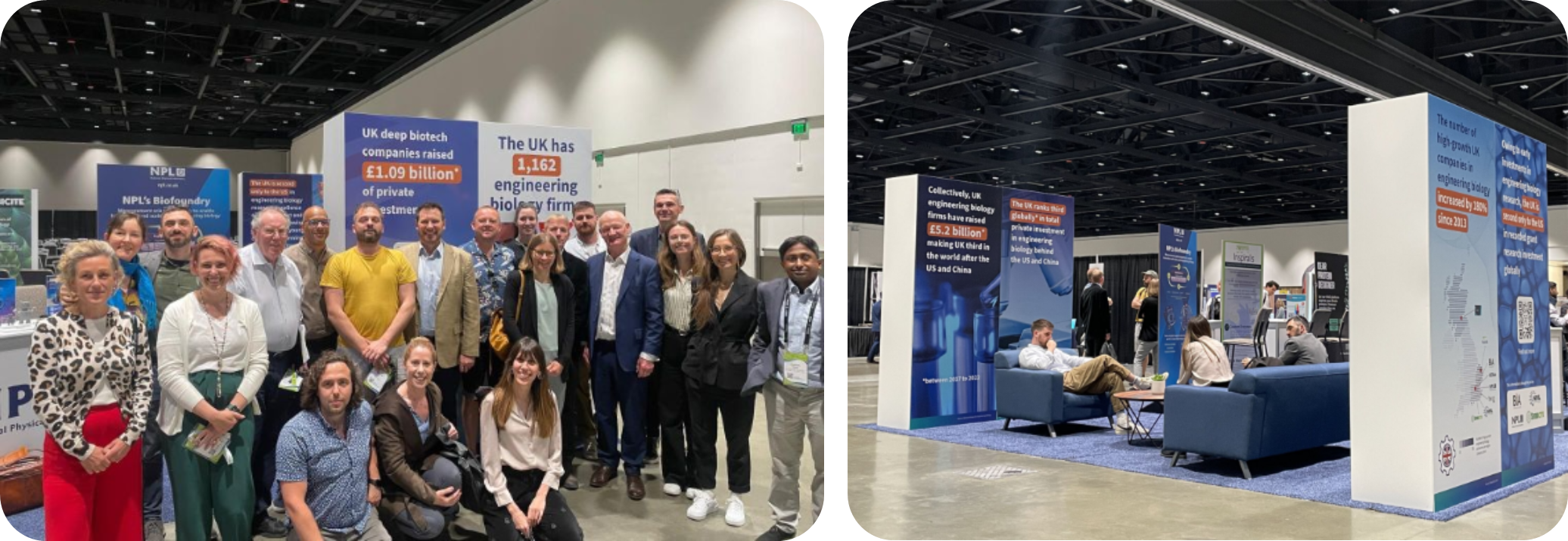
BIA representing UK innovation at Synbiobeta 2025 in California
As part of the Pavilion, the chair of the Regulatory Innovation Office (RIO), Lord Willets, took to the main stage to share insights on the strategic role of engineering biology in the UK’s economic and scientific future. This was followed by a BIA meeting with Lord Willets in London in June to discuss the role of RIO in removing regulatory barriers across engineering biology and the life sciences.
The conference also marked the launch of the latest BIA Deep Biotech report - a comprehensive analysis of the trends, technologies, and investment patterns shaping the future of deep biotech.
Members showcase UK strength in engineering biology during Korean trade mission
In June, BIA partnered with the Foreign, Commonwealth & Development Office (FCDO), the Department for Business and Trade (DBT), and the British Embassy in Seoul to host a Korean trade delegation visiting the UK. The delegation comprised Korean companies and stakeholders looking to partner with UK engineering biology innovators.
Korean delegates met with UK-based engineering biology companies at the BIA offices to explore commercial opportunities across innovative new solutions, manufacturing and scale-up, highlighting the UK’s leading R&D capabilities in engineering biology.
Alongside the programme of meetings, BIA met with representatives from FCDO, DBT and the British Embassy to discuss opportunities to strengthen links between the UK ecosystem and innovation and industrial capacity in Korea and Japan.
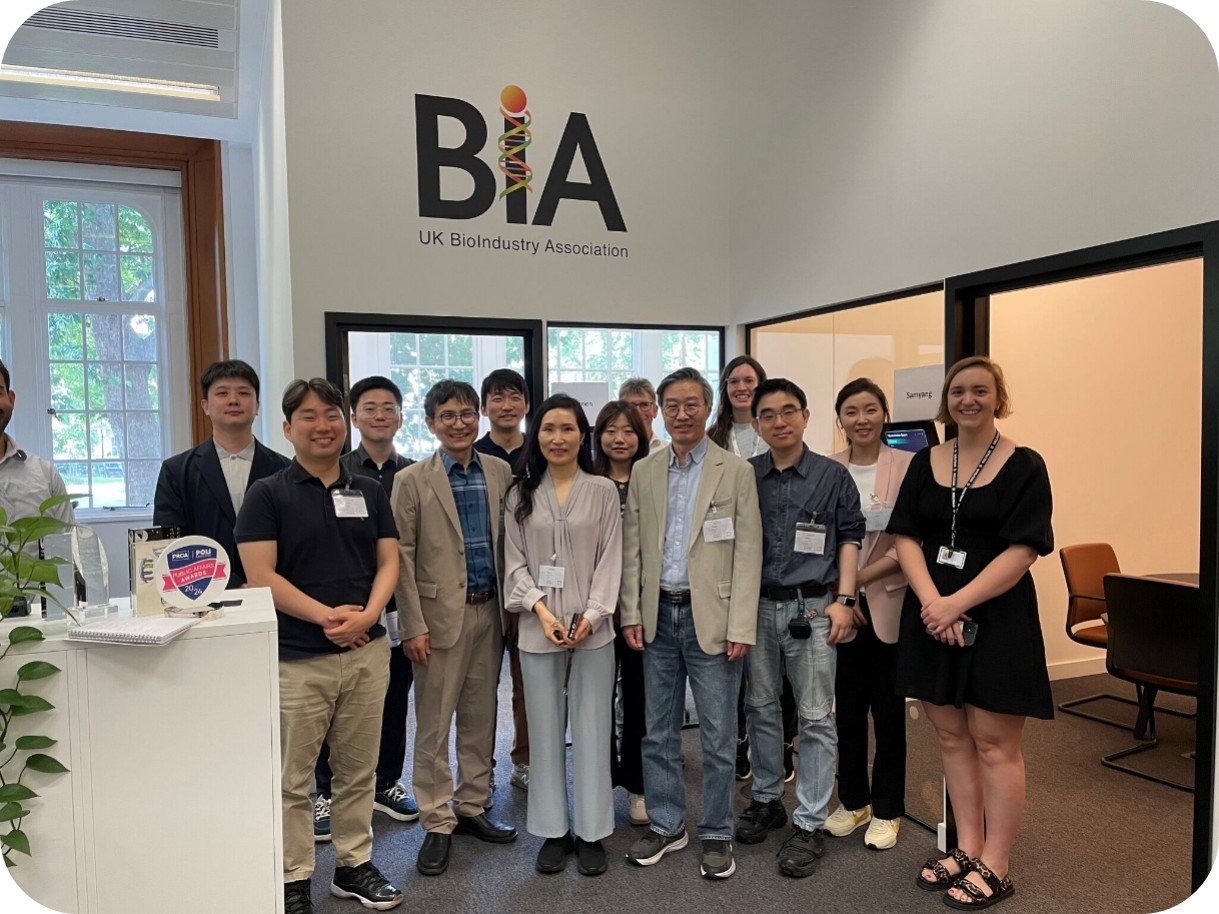
Korean trade delegation visit the BIA office to meet with UK firms
TechBio and Genomics
Importance of health data access highlighted in data brokers and national security consultation
BIA highlighted the importance of data sharing to the life science sector in our response to Government’s consultation on data brokers and national security. Data is increasingly being seen as a national asset and government consulted on the role of data brokers in data sharing. BIA dissected the vital role that data brokers play in facilitating access to data for research and innovation, while warning that public trust is fundamental to this. We also discussed the breadth of use of data across the sector and the definition of a ‘data broker’ within our sector.
DSIT will be using consultation responses to support policy development to ensure the security of UK data. The consultation comes after changes to data sharing policy in the United States and following press coverage of UK Biobank. Our response called for a measured approach to data security and access, prioritising secure access for UK innovators in the sector.
New NHSE data feedback group formed, following joint BIA report
The NHSE data for R&D programme’s SDE network has launched a new customer experience group, following calls for better user engagement in our recent joint report. The new group will help support technical service improvements across the NHS Research SDE Network to meet the needs of health data users across the sector.
The NHSE network of secure data environments will become the default route for accessing NHS data in the future. BIA, ABHI and ABPI published a joint report calling for industry representation on advisory groups. This new group will help bring the vital user perspective to the network.
Government has also announced investment in a health data research service, in collaboration with the Wellcome trust. The service should help streamline the process of applying for and accessing UK Health Data, including NHS data. BIA have consistently called for a unified national system with streamlined governance – including in our response to the Sudlow Review. Find out more about the Health data research service in our blog.
Strategic opportunity of functional genomics shared with Government
BIA has highlighted the importance of functional genomics with government through our recent report: Functional genomics explainer: A strategic opportunity for the UK. The government has previously acknowledged the importance of genomics, including through £650 million recently announced for Genomics England. However, the importance of building on existing programmes, through investment in functional genomics is not as well recognised.
The report explains what functional genomics is to a lay audience. It outlines why the UK is at an advantage in this area and what should be done to build on this, including:
- Coordinated investment to understand disease biology;
- Collaborative infrastructure that enables the sharing of data, tools and techniques;
- Enhanced data standards, data linkage and platforms for bringing together disparate genomics data;
- Development of pre-clinical models which better represent human biology and are more reliably predictive of therapeutic outcomes in humans.
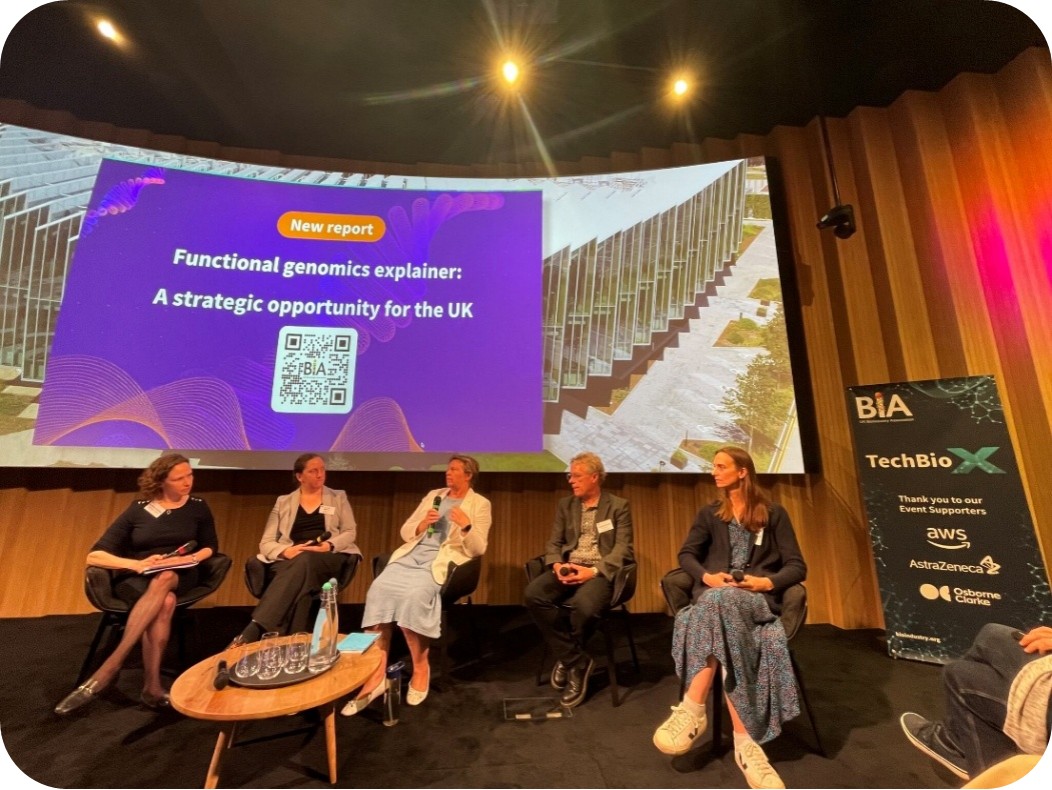
Launching the explainer at Cambridge Wide Open Week, with an insightful panel discussion featuring Nicola McCarthy (Milner Institute), Mathilda Davidson (Osborne Clarke) and Steve Harrison (Nucleome Tx)




